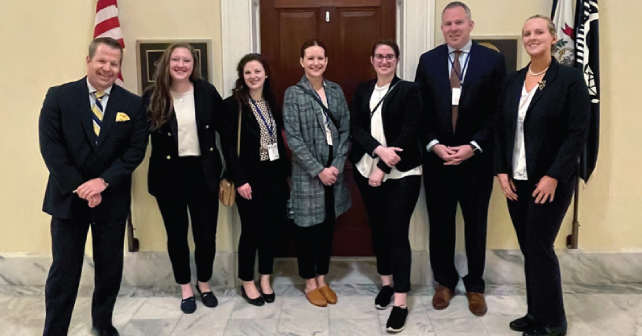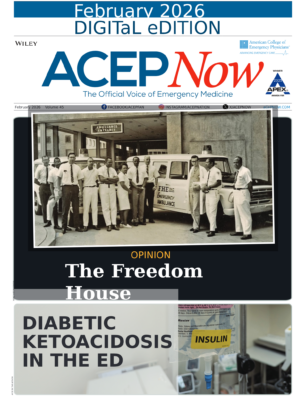
Catherine “Kirby” Kirbos, MD, is a fellow at West Virginia University who works at several different emergency department (ED) sites, from the state’s Level I trauma center to rural, critical access sites. When she works overnights at Braxton County Memorial Hospital in Gassaway, West Virginia, her three-woman team (herself and two nurses) receives patients from six small towns nearby. “Small but mighty,” is how Dr. Kirbos describes it.
Explore This Issue
ACEP Now: Vol 42 – No 06 – June 2023As a member of the West Virginia delegation at ACEP’s Leadership & Advocacy Conference (LAC) in May 2023, Dr. Kirbos got a chance to explain her day-to-day challenges to her state’s legislators, including Sen. Joe Manchin. LAC is all about taking the national issues that every emergency physician at the conference is lobbying for—in this case, ED boarding and workplace violence—and making it come to life for legislators by explaining how it is happening in their own backyard.
What is happening in West Virginia’s backyard? Quite a bit, actually. In January 2023, Forbes ranked West Virginia as the least healthy state in the country.1 The state tops the country in overdose deaths per population.2 West Virginia has the highest percentage of adults who smoke and the second-highest obesity rate in the country. The state’s high poverty rate and challenging terrain cause many to defer basic health care, leading West Virginia to rank the highest of all states in mortality rates for cancer, diabetes, heart disease, and kidney disease.2
“Here in West Virginia, we try to take a rural perspective on everything,” said Chris Goode, MD, FACEP, who was making his 10th trip to LAC. “When you’re working with your local Congressmen, Congresswomen, Senators, it is really important to put that statewide perspective on these very national issues.”

Meet the West Virginia contingent at LAC23: Catherine Kirbos, MD; Adam Crawford, DO; Kaitlyn Meads, DO; Hannah Marvin, DO; Carol Wright Becker, MD; Christopher Goode, MD; Darcy Autry, MD. (Click to enlarge.)
Many of these health problems and access-to-care concerns come to a head in West Virginia’s emergency departments, both big and small. Like many emergency departments across the nation, the state’s larger EDs are overcrowded. When those facilities have no room to accept transfers, that puts the emergency physicians at the smaller rural facilities, like Dr. Kirbos at Braxton Memorial, in a tough spot.
“We are managing extremely sick patients in small critical access hospitals to the best of our ability, waiting for transfer elsewhere,” she explained. “Even worse, when we do finally get a patient accepted at the larger facility for transfer, we often don’t have an ambulance or EMS crew to transport them because we are stretched so thin.”
The emergency physicians from West Virginia gave their legislators vivid descriptions of how psychiatric boarding, specifically prolonged pediatric psych boarding, can really limit the beds available to see other patients who desperately need care.
They found an understanding ear when meeting with the health advisor for Sen. Shelley Moore Capito, who had recently introduced one of the bills ACEP members were lobbying for during their meetings, S.1346: Improving Mental Health Access from the Emergency Department Act. The bill would help address a significant component of psychiatric boarding by providing grants to EDs to increase access to follow-up psychiatric care for patients, such as expedited placement, increased telepsychiatry support, expanded availability of inpatient psychiatric beds, increased coordination with regional service providers, and regional bed availability tracking and management programs, based on the individual needs of their EDs and communities. When the West Virginia contingent explained to their legislators why ED violence is such a concern, Dr. Kirbos set the scene.

The West Virginia group of emergency physicians discusses ED boarding and workplace violence concerns with Sen. Joe Manchin at LAC23. (Click to enlarge.)
“Up until very recently, within the last couple months only, [Braxton Memorial] had no formal security guards,” Dr. Kirbos said. “It can be daunting when you have an all-female night shift team and a belligerent, violent patient presents. While we have been trained in de-escalation techniques and the use of proper safety chemical and physical restraints, our lack of security and/or police support is a real problem. The police force monitors multiple local towns and are stretched thin with resources overnight as well, so a call for response to our facility often takes at least 20 minutes.”
The group talked extensively about how the state’s high rates of drug use increases the risk of workplace violence for all health care workers. They asked their legislators to support the Workplace Violence Prevention for Health Care and Social Service Workers Act, and the Safety from Violence for Healthcare Workers Act, which would require employers to set safety protection standards for workers and provide additional funding and resources for security needs, respectively.
After a big day of meetings, the West Virginia emergency physicians felt like they did their best to help legislators understand how these national problems are affecting them in EDs across the state.
“There’s something special about going in person to speak to our state legislators,” said Dr. Kirbos. “It’s difficult to visualize and understand our needs through email or a phone call. Change best happens by showing up—telling our personal stories, painting a picture of what the small, critical access ED really looks like, giving a glimpse into the life and challenges that we lead as health care clinicians.”
References
- National Center for Health Statistics. Drug overdose mortality by state. Centers for Disease Control and Prevention website. Accessed May 26, 2023.
- Materson L, Megna M. States with the least healthy populations, ranked. Forbes Advisor website. Updated January 17, 2023. Accessed May 26, 2023.
Pages: 1 2 3 | Multi-Page





No Responses to “West Virginia EPs Explain Challenges of Rural EM to Their Legislators”